Podcast
Questions and Answers
Which phase of the cell cycle is characterized by DNA replication?
Which phase of the cell cycle is characterized by DNA replication?
- S Phase (correct)
- G1 Phase
- Mitosis
- G2 Phase
During interphase, the cell is inactive and not preparing for division.
During interphase, the cell is inactive and not preparing for division.
False (B)
What critical checkpoint occurs in the G1 phase?
What critical checkpoint occurs in the G1 phase?
The cell checks if the environment is favorable and if the necessary resources are present for DNA replication.
During the G2 phase, the cell checks for _____ errors and repairs any found.
During the G2 phase, the cell checks for _____ errors and repairs any found.
Match the following cell cycle phases with their key characteristics:
Match the following cell cycle phases with their key characteristics:
What happens to sister chromatids during anaphase?
What happens to sister chromatids during anaphase?
Cytokinesis can only occur after telophase is complete.
Cytokinesis can only occur after telophase is complete.
What role do spindle fibers play during metaphase?
What role do spindle fibers play during metaphase?
Flashcards
Interphase
Interphase
The longest phase of the cell cycle; intense cellular activity preparing for cell division.
G1 Phase
G1 Phase
Cell growth and protein synthesis; crucial checkpoint for cell division.
S Phase
S Phase
DNA replication; creating identical sister chromatids.
G2 Phase
G2 Phase
Signup and view all the flashcards
Mitosis
Mitosis
Signup and view all the flashcards
Prophase
Prophase
Signup and view all the flashcards
Metaphase
Metaphase
Signup and view all the flashcards
Anaphase
Anaphase
Signup and view all the flashcards
Study Notes
Interphase
- Interphase is the longest phase of the cell cycle, encompassing the period between cell divisions.
- It's not a period of inactivity but rather a time of intense cellular activity where the cell prepares for cell division.
- Divided into three subphases: G1, S, and G2.
G1 Phase (Gap 1)
- Characterized by significant cellular growth.
- The cell synthesizes proteins and organelles.
- The cell increases in size and mass.
- Critical checkpoint for determining whether or not the cell will proceed to DNA replication (S phase).
- Cell checks if the environment is favorable and if the necessary resources are present for DNA replication.
- Unsuitable conditions or damaged DNA can cause the cell to enter a resting phase (G0).
S Phase (Synthesis)
- DNA replication occurs in the nucleus during this phase.
- Each chromosome duplicates, forming two identical sister chromatids.
- The resulting chromosomes are genetically identical to each other.
- Histones and other proteins necessary for DNA structure are simultaneously synthesized.
G2 Phase (Gap 2)
- The cell continues to grow and synthesize proteins.
- Important for duplicating organelles and finalizing preparation for mitosis.
- The cell checks for DNA replication errors and repairs any that are found.
- Cell also checks if the DNA replication has occurred entirely and accurately.
- The cell ensures all the necessary structures (ex. centrosomes) are duplicated for division.
Mitosis
- Mitosis is the process of nuclear division where two genetically identical daughter nuclei are created from a single parent nucleus.
- Four distinct phases: prophase, metaphase, anaphase, and telophase.
Prophase
- Chromosomes condense and become visible under a microscope.
- The nuclear envelope begins to break down.
- Spindle fibers start to form outside the nucleus.
- Duplicated centrosomes move to opposite poles of the cell and assemble spindle fibers.
Metaphase
- Chromosomes align at the metaphase plate in the center of the cell.
- Spindle fibers attach to the centromeres (the region that joins sister chromatids).
Anaphase
- Sister chromatids separate and are pulled to opposite poles of the cell by the shortening spindle fibers.
- The cell begins to elongate.
Telophase
- Chromosomes decondense and become less visible.
- New nuclear envelopes begin to form around each set of separated chromosomes.
- Spindle fibers disappear.
- Cytokinesis can occur during telophase or immediately after.
Cytokinesis
- Cytokinesis is the division of the cytoplasm that follows upon mitosis.
- Formation of the cleavage furrow in animal cells, and a cell plate in plant cells.
- Two genetically identical daughter cells are formed from the single parent cell.
Studying That Suits You
Use AI to generate personalized quizzes and flashcards to suit your learning preferences.




